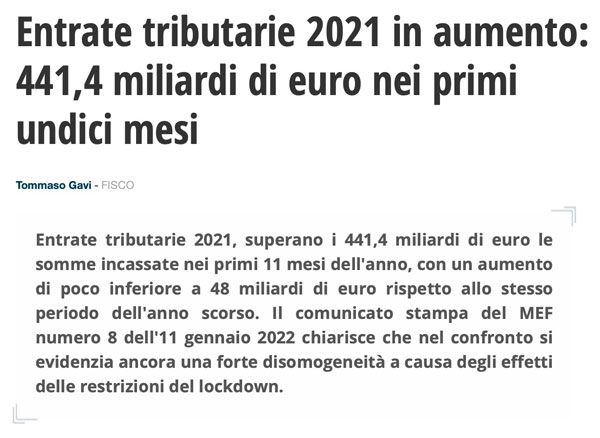The 5 causes of inflation

The increase in inflation can be traced back to 5 causes that are to be identified in sectors of the economy and politics, in part they originate from the era in which we live and in part we have already experienced them in the past.
Why are prices rising today?
Prices rise both due to international tensions and the after-effects of the global economic blockade due to covid-19, but also due to the energy crisis. Prices rise because there is more money in circulation than what goods and services can be bought. Or, seen the other way around, there is so little to buy, that is, the supply is very low, that the demand sends prices up in the air. because goods have become scarce, that is, "rare".
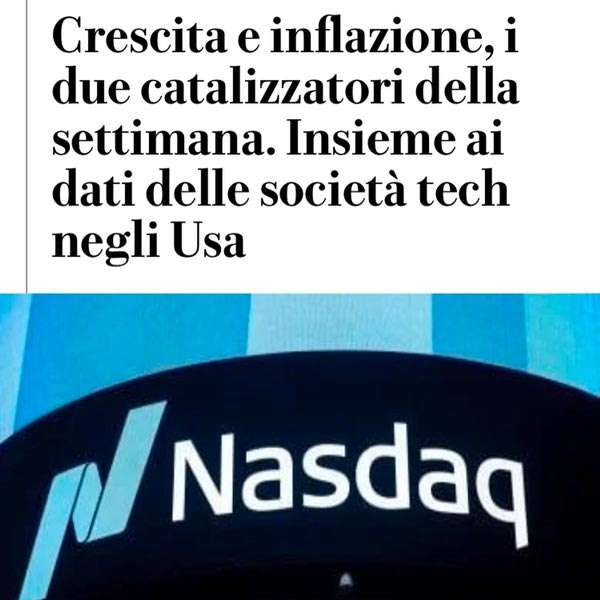
Is the inflation data real?
Is the inflation data we are being told true or is it rigged?
Understanding this is very simple. Just look at the shopping cart. Does it cost us 5% more than a year ago or are the increases higher?
Yes, because the official figure in Europe is 5%, but it is widely believed that this is a false figure.
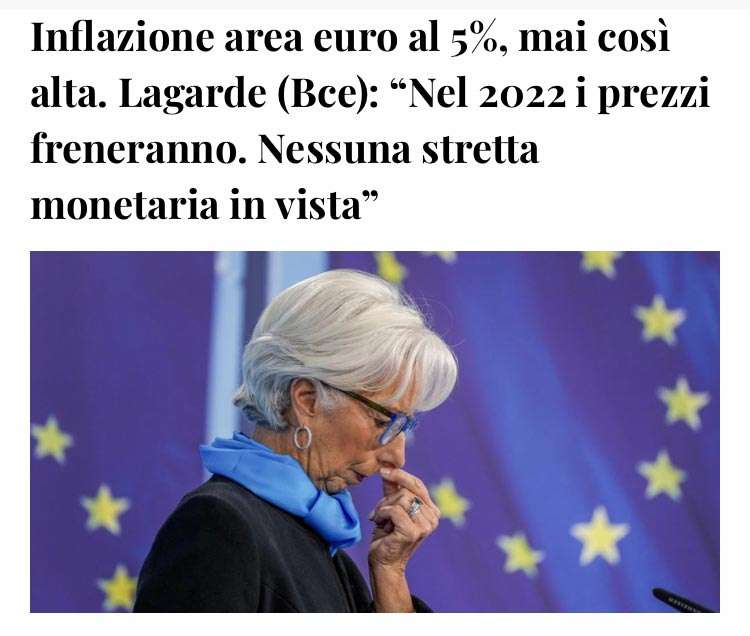
The rise in inflation explained in 5 reasons
Here is the list of the 5 reasons that are driving current inflation.
1 globalization
Globalization has effectively transformed China from a factory of the world to a monopolist of global production.
It follows that, now that a large part of production depends on it, after it has infiltrated and unhinged foreign markets also and above all through unfair competition, China can now make the prices it wants.
When we hear about unfair competition we immediately think of commercial policies aimed at rigging the market with unreal prices made in order to outperform the competition.
This practice in technical jargon is called DUMPING .
To better understand this concept , read this article.
Furthermore, having relocated too many productive activities means that there is less work but more consumers of foreign goods.
This, as we have now learned by heart, has helped to reduce wages and therefore to consume less, especially made in Italy goods, increasingly out of reach of our wallets.
So if you put money into the economy, but don't create jobs, you produce inflation – see point 3.

IF YOU WANT TO STOP THE ECONOMY CARE OF YOU
START DEALING WITH ECONOMICS
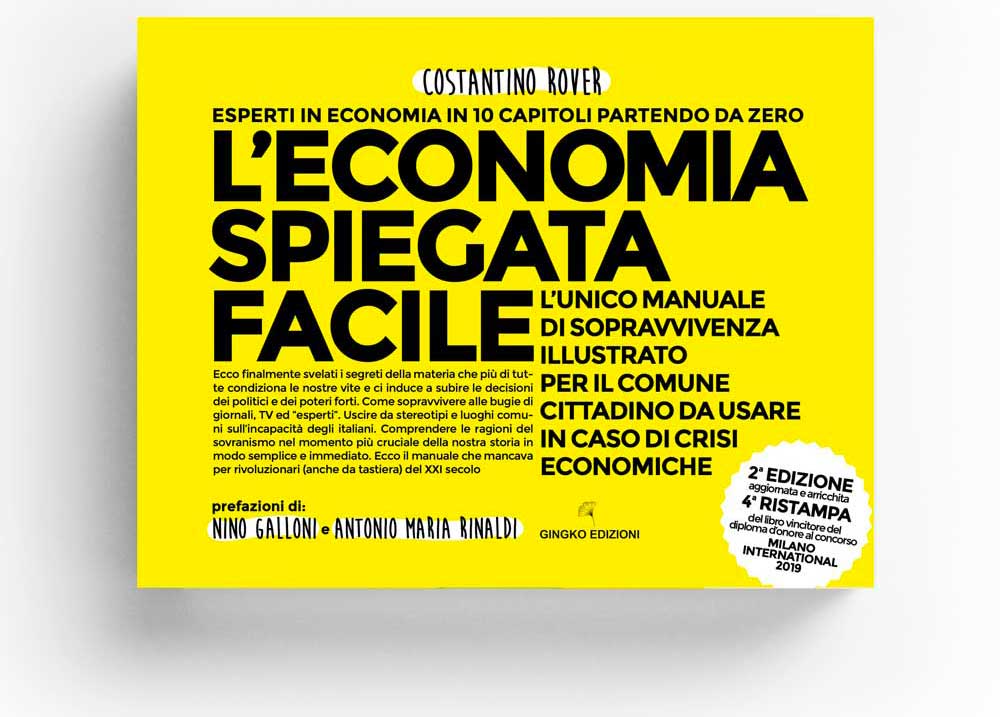
 BUY IT NOW
BUY IT NOW
2 The energy crisis
The energy crisis has not only caused energy prices to rise – which is obvious – but is also affecting the prices of agricultural products.
Energy crises are cyclical. The last dates back to the seventies.
But today, compared to 50 years ago, agriculture is even more dependent on chemistry.
With the increase in gas prices there has been an increase in the price of the ammonia that is obtained from it. As a result, since a lot of fertilizers are made from ammonia, we have seen crop prices rise.
These increases occurred both because fertilizers affect the price of production and because those who could not afford the fertilizers had to reduce their purchase. And this has negatively affected the income of some land.
Once again, therefore, lower production leads to higher prices.
The energy crisis is aggravated by the tightening of the Russian gas taps. The reason is obviously to be found in the tensions between the US and Russia over control of Ukraine. On the one hand, the Americans are trying to bring Ukraine into NATO and with the help of the EU they are forcing diplomacy to do so. On the other hand, Russia is doing it to keep it under its influence.
Putin's spite is to limit gas exports to Europe to cause inconvenience and price increases.
Again; less raw material distributed and therefore an increase in prices than that available (see point 5).
3 The closure of commercial activities
(total or partial) for over a year
Exactly as in the previous article "Questions about Covid, Easy Explained Economy answers" we reiterate a key concept that evidently most had escaped; perhaps because everyone took to exalting Conte's stroke of genius: to close the activities by financing them by injecting liquidity into the economy which I however put under lock and key.
We self mention:
"The State … will guarantee up to 50 thousand euros on each loan, without even going to review the merit of the borrower."
In our opinion, the problems are mainly two, of a practical nature:
1) what do you do with loans if you have a closed factory or shop and if consumers are authorized to access only basic needs (or online purchases on marketplaces), while you sell hardware, you manufacture cylinders for tanning sector, are you a stylist or do you program apps for socialization or logistics?
… If there is nothing to buy or we are prevented, at the end of all this money what do we make of it?
Who will pay the debts?
And what inflation will ensue?
Here, now it is clear to everyone without too many explanations what we meant almost a year ago.
To this "excess" liquidity, that is unused, was added all that which, those who kept their jobs did not spend during the lockdown but decided to spend it with the reopening of the shops.
It follows that now that currency has also entered circulation, with the problem that it does not counteract the supply of necessary products.
If production stands still, what little is left on the market will be so insufficient that excess money will produce inflation.
Why had inflation not been felt for so many years despite all the central banks pumping billions into the markets?
Despite the trillions pumped by central banks, the goal of increasing inflation had been missed. How come?

Because for all these years those billions had remained in the markets and had arrived at the real economy with the dropper (at least in Europe).
Today, on the one hand, the "aid" has arrived and on the other hand production has not started, especially the internal one, the problem just mentioned is repeated.

So if anything, the firepower would have served during the twenty years preceding the coronavirus, not during the pandemic, given that the commercial activities and a large part of the productive ones, in this period, were destined to remain closed.
Because money is used to make exchanges possible, but if you prevent exchanges, what do you do with money?
4 The collapse of GDP
The collapse of the GDP caused by what has been said in point 3. If the GDP collapses but the taxation remains stable or even increases, what happens?
There is a slowdown in the economy caused, not only by the reduction in production and therefore by the drop in the supply-demand ratio (the decline in GDP mainly depends on this), but also by a taxation that comes at the wrong time.
Yet this taxation has a very practical effect at the macro-economic level: it helps to remove the excess liquidity that is generating inflation.
In fact, as we explained in the easy explained economics book , one of the tasks of taxes is precisely to regulate the amount of excess money present in the economy.
In Europe, inflation is also due to the fact that the ECB has decided not to raise interest rates.
To neutralize inflation, the ECB would have to raise interest rates. This would also raise yields on securities, offsetting the losses suffered as a result of inflation by markets and savers (or rather, even small investors).
However, in this way the States would have to pay higher annuities to the savers themselves at maturity.
By increasing the yields, the owners of the securities would earn more by offsetting the losses from inflation, but on the other hand, the states, especially those of southern Europe, that is, those most indebted, would face the risk of default, putting the risk of collapse as well. eurozone and the euro.
Instead, letting inflation run is needed both to burn in value part of the excessive liquidity in circulation – on the savers side (therefore trivially our savings), and to keep the euro alive.
After all, being part of the same club as Germany, France, Holland, Sweden, etc. it is a luxury that someone has to pay for.
Since the euro has existed, businesses, savers and workers have taken care of it.
But we have already said all this in the article entitled, Non-Stop Inflation is Burning Your Savings. Are yours safe? which we recommend reading.
The ECB, after having chosen to embrace inflation, appears to have taken instructions to please the markets, according to Lagarde's voice …
1

2
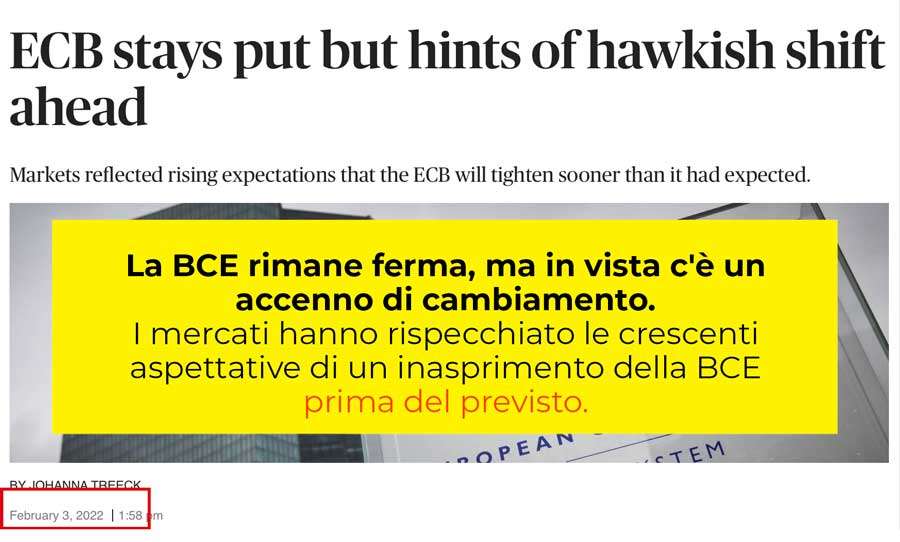
3

But both in the event that rates remain unchanged, or that they will be increased, Italy will pay the price.
While it is true that if the ECB continues to purchase government bonds on the secondary market (i.e. by quantitative easing – QE) the impact of the interest rate increase on public debt will be reduced, it is also true that it would be a question of postponing the ball of inflation – but with greater burdens – to next year.
So it doesn't solve the problem. On the contrary.
If, on the other hand, the ECB were to suspend QE then we would be fried.
5 Geopolitical tensions
The sum of all these factors should lead us to ask the question of what could be the triggering cause.
In our opinion, the main one is the confrontation between powers at a geopolitical level.
With Europe acting as the US's carry dog on the Ukrainian front, Russia has turned off the gas supply taps, causing the price of energy to skyrocket.
Here is yet another demonstration of what we said in our second book: ECONOMIES / GRAM : that the real plot against us consists in having perfect fools in all top positions.
The tests are all in ECONOMI / GRAM .
It should be noted that this happens in the middle of winter and with Norway and Sweden struggling with a low income from energy plants from renewable sources – in full ecological transition (we have chosen the very best time also for the conversion to renewables – what a perfect timing).
Again to reiterate the above.
If Norway has managed to cope with the decline in wind currents, with the exploitation of its oil fields, Sweden is facing maintenance work on the rivers on which three of the main hydroelectric plants are located.
In the meantime, China, being a monopolist of global production, can now condition the world distribution chain by raising the prices of containers as well as of production. And here the import prices from China have gone up.
We have already talked about this extensively in this article or in this video .
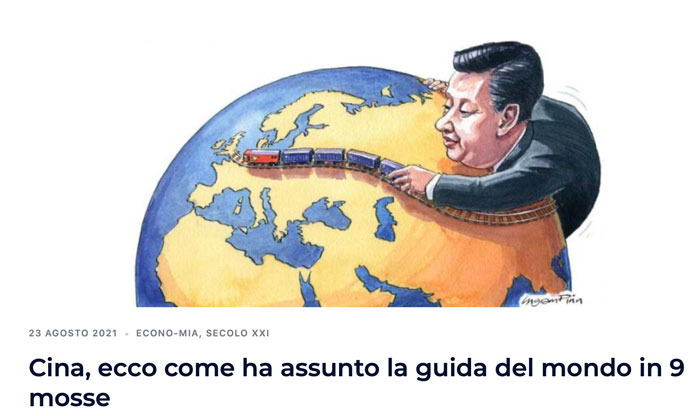
VIEW? KNOWING THE ECONOMY IS CONVENIENT
TODAY IS ALSO EASY

 BUY IT NOW
BUY IT NOW

Thanks to our Telegram channel you can stay updated on the publication of new articles of Economic Scenarios.
The article The 5 causes of inflation comes from ScenariEconomici.it .
This is a machine translation of a post published on Scenari Economici at the URL https://scenarieconomici.it/le-5-cause-dellinflazione/ on Mon, 07 Feb 2022 09:50:03 +0000.



